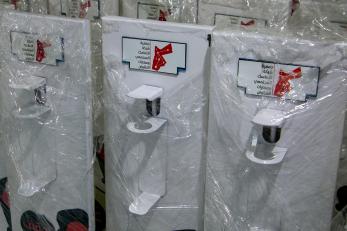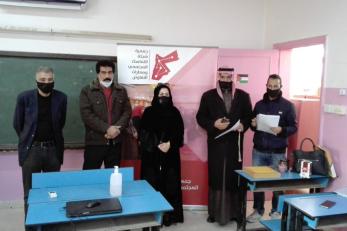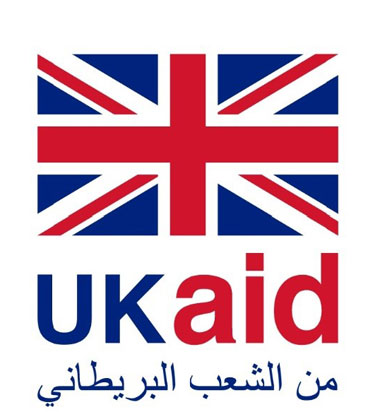Mercy Corps launches Tamasok campaign to distribute hygiene kits and promote hygiene practices in 108 Jordan schools

All preschools, schools, and universities in Jordan have been closed since mid-March and remote education has been taking place to this moment as a preventive measure to control the spread of COVID‑19.
Jordanians await the governmental decision to allow students to return to their schools and universities. Mercy Corps - in partnership with the Network for Social Cohesion and Negotiation Skills - launched a campaign to support teachers to prepare for the restart of face-to-face education.
Mercy Corps and the Network for Social Cohesion and Negotiation Skills - a registered national NGO of over 650 community leaders that were originally established as part of a UK aid-funded program - are preparing to distribute 5,400 hygiene kits and to deliver awareness-raising sessions in 108 schools across 11 governorates in the Kingdom.
Each teacher in the targeted schools receives a hygiene kit that includes hand sanitizer, a mask, and wet wipes. Adding to the above, the campaign provides the targeted schools with two hygiene stands and two thermometer devices per school.

In addition to that, the campaign helps to enhance teachers’ awareness of how to deal with COVID‑19. Community leaders have been distributing informational flyers approved by both national and international health agencies clarifying a set of preventive guidelines that limit the spread of infection and protect the society and individuals. Mercy Corps will promote hygiene practices among 5,400 teachers in the targeted schools, which will help teachers share the information with their students when they go back to on-campus education.
About the Network for Social Cohesion and Negotiation Skills
Since 2013, Mercy Corps has been building the capacity of community leaders - Jordanian and refugee men, women, and youth - to mitigate tensions, build social cohesion and amplify voices of citizens. Until recently, the community leaders worked under Mercy Corps-managed programs, supported by UK aid.
Now, as an independent and national association, the Network for Social Cohesion and Negotiation Skills is the first formal network of civil negotiators in Jordan and consists of over 650 community leaders representing 39 high tension communities in 11 of the 12 governorates across Jordan, many of which are considered poverty pockets. The need for more localized, diverse and specialized civil society organizations, such as this one, is clear as civil society organizations in Jordan are traditionally underdeveloped and overwhelmingly Amman-centric.
The Network was formally registered as a Community Based Organization (CBO) under the Ministry of Social Development in August 2018 and now has around 650 members. All members have been identified as representatives by the communities themselves.
This campaign is part of the Leadership and Community Development program funded by FCDO (UK aid) and implemented through Mercy Corps Jordan.
Through this program, Mercy Corps is implementing a wide range of activities in response to COVID‑19 including apprenticeships for 260 job opportunities across five governorates (Amman, Zarqa, Irbid, Karak, Aqaba). It will also support 25 businesses affected by the COVID‑19 crisis through small grants, as well as the Maasal campaign which aims to promote local businesses and products. In addition to that, Mercy Corps supports youth initiatives that focus on the mitigation of the impact of COVID‑19. In collaboration with the Ministry of Health, Mercy Corps supports the government in responding to the current COVID‑19 crisis.
Funded by FCDO
